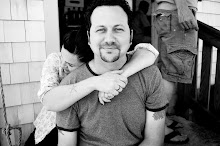The Conservative Era, from Reagan to Bush (and now, Obama), has created a landscape that would make Upton Sinclair blush. Once the oil is capped and the Gulf is cleaned (if that is even possible), something real needs to be done to clean up Washington D.C. and its stink of corporate influence, which has already managed to pollute almost everything there. Until then, I will sooner eat oil covered gulf shrimp than buy anything that comes out of those fetid waters.
Visit msnbc.com for breaking news, world news, and news about the economy
A transcript of the closing of the May 3 Rachel Maddow Show:
So, here we are again on America's Gulf Coast, the Louisiana shoreline reporting on an environmental, economic and human catastrophe. This fragile stretch of our country being ripped apart again just as the wounds of the last disaster were beginning to heal here -- that of course was hurricane Katrina, which ravaged the barrier islands off the coast here and leveled much of Venice, Louisiana, where I'm sitting tonight. That was 2005. Here we are again in 2010.
If there's a unifying truth in this state, in this region, it is that the wetlands are the only means of survival. Nobody argues this point. Republicans, Democrats, nobody argues this point.
The wetlands are to the Gulf Coast what bumpers and crumple zones are to cars. It's a buffer against the impact, an absorber of destructive energy, a giant protector against disasters. Wetlands slow and weaken hurricanes before they reach places like New Orleans. They support wildlife. They support human economy. They are incredibly, incredibly fragile, and they have to be preserved if they are going to preserve us. The marshes were built by nature over thousands of years, built by the Mississippi River's floods which left settlement in fresh water. That pushed the edge of the continent out into the Gulf of Mexico by as much as 100 miles.
But since, the 1950s, the pursuit of profit has forced 8,000 miles of marshes to yield to manmade canals -- essentially, to make oil exploration and shipping easier. It's estimated that the state of Louisiana loses 25 square miles of wetlands every year. If we were losing that much land to another country, we would be at war.
America has a choice to make about the State of Louisiana. Is Louisiana part of our country or isn't it? Because if Louisiana is part of America, then the American people and the American government have to begin to defend Louisiana against American greed, and multinational greed. Because yes, legally it's the job of BP, the oil company, to clean up this disaster that looms over this wetlands behind me right now.
But who among us believes that any company really wants to defend America, as much as we as a nation want to defend us? The gain sucked out of the sea bed here is private, it's profit, it supersedes to these pesky little regulatory bodies called countries, but the risk here, again, the risk here as always isn't private. It's public, it's national, it's American. It's borne by Louisiana again, literally borne by the land here and by the people here. The incentives all line up neatly for the companies who profit up a natural resources here to take what they can and damn the consequences.
For us as a country, if we believe in Louisiana, somebody's got to stand up against those companies on behalf of the public, the land, the people, the country.

"But since, the 1950s, the pursuit of profit has forced 8,000 miles of marshes to yield to manmade canals -- essentially, to make oil exploration and shipping easier."
ReplyDeleteThis. This is what adds insult to injury for me (in addition to the slow march of waiting to find out just how bad it will eventually be for us down here). Truth told well. Good on Rachel.